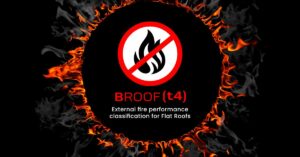
BRoof(t4) Testing & Certification for Liquid Roofing Systems: What Contractors and Customers Need to Know
Learn how BRoof(t4) certification ensures fire safety and compliance for liquid roofing systems, benefiting both contractors and end users.
We value your privacy
Cookies are small text files stored on your computer by websites you visit. They help users navigate websites efficiently and enable certain essential functions.
Cookies necessary for the website to function properly can be set without your consent, while all other cookies require your approval before being used in your browser.
Additionally, we use cookies to gather data for personalizing and evaluating the effectiveness of our advertising.
For more information, please refer to the Google Privacy Policy.
You can find the list of all the cookies that we use on our website here.